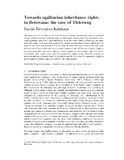| dc.contributor.author | Kalabamu, F.T. | |
| dc.date.accessioned | 2011-03-10T12:07:11Z | |
| dc.date.available | 2011-03-10T12:07:11Z | |
| dc.date.issued | 2009 | |
| dc.identifier.citation | Kalabamu, F.T. (2009) Towards egalitarian inheritance rights in Botswana: the case of Tlokweng, Development Southern Africa, Vol. 26, No. 2, pp. 209-223 | en_US |
| dc.identifier.issn | 1470-3637 (Online) | |
| dc.identifier.issn | 0376-835X (Print) | |
| dc.identifier.uri | http://hdl.handle.net/10311/745 | |
| dc.description.abstract | This paper explores the extent to which recent social, economic, demographic and environmental
changes in Botswana have enabled women to inherit land, housing and other household assets.
Using qualitative data from a study undertaken in the peri-urban village of Tlokweng, the paper notes that, unlike in the past when women were largely excluded from property inheritance, the
majority of parents who participated in the study on which this paper is based are now more
inclined and willing to share their estate equally among all their children or to favour daughters
over sons in deciding who should inherit residential properties. The changes, which are heavily contested by older women, young men and teenage boys, appear to have been due primarily to
increased numbers of female heads of households and the role played by unmarried daughters
in developing the family estate and caring for the aging parents. | en_US |
| dc.language.iso | en | en_US |
| dc.publisher | Taylor & Francis (Routledge), http://www.informaworld.com/smpp/title~content=t713413745 | en_US |
| dc.subject | Property inheritance | en_US |
| dc.subject | Customary laws | en_US |
| dc.subject | Gender | en_US |
| dc.subject | Generation | en_US |
| dc.subject | Botswana | en_US |
| dc.title | Towards egalitarian inheritance rights in Botswana: the case of Tlokweng | en_US |
| dc.type | Published Article | en_US |
| dc.link | http://pdfserve.informaworld.com/862581_731385705_912041388.pdf | en_US |

